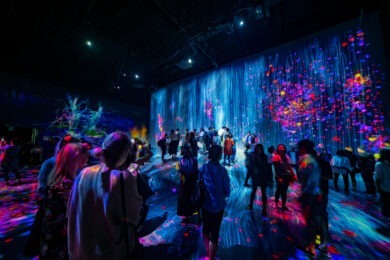They kid me at work that I mention Red Bull once a day. This is not true—sometimes, it’s far more often than that. This isn’t because I’m addicted to energy drinks (although I’m often exhausted enough to need one) but because I had a 10-year stint working with Red Bull’s global creative agency, in both the U.K. and U.S.
And, as DesignScene, my employer, is a live event and experiential agency, there’s often a parallel between the challenge we’re confronted with and the insights I gained working on a brand that set the bar when it came to delivering unique live experiences.

Events agencies are facing enormous challenges right now. Uncertainty is the killer. (Just ask the financial markets.) Our autumn calendar certainly looks packed, as spring and summer’s events have been moved out. But what the world will look like in October is an entirely different matter. No one can be certain that restrictions on travel and public gatherings will have been lifted entirely by then, even within nations, never mind across borders. Will clients and brands be prepared to risk the upfront investment on securing venues, hotels, flights, hotels, as well as paying agency overheads, in preparation for events that might be called off, locked down or restricted?
If you’re a marketeer, you’d certainly be disinclined to risk your budget when the investment looks quite so flaky. To borrow from Oscar Wilde, “To lose one event budget may be regarded as misfortune. To lose two looks more like carelessness.”
So how can you insulate yourself against the uncertainty and de-risk your future investments? Indeed, is there a new model for live events that makes sense in the post-coronavirus world? This is where the Red Bull reference becomes relevant. (See, that’s twice in one post.)
Many of the brand’s most popular live experiences are operated as world tours, with stop-offs in key markets. As a result, Red Bull is like the circus coming to town—a cause for excitement that creates tangible buzz. The fact that other events in the tour have already happened builds anticipation in each next locale. Consumers eat up the content of the global tour events, and then descend on the local one in droves. (If an activity is only appropriate to a specific market, the event tour becomes nationwide rather than global.)
The strategy is simple yet brilliant: combine the impact of an at-scale event series with the credibility and local relevance of an experience that’s happening close to home.
Now, I’m not suggesting for an instant that we want consumers to descend in droves on your next conference or event, whether corporate or nonprofit. The point of the Red Bull example is to suggest a way forward. Which, like your grandma’s advice on just about everything (which I singularly failed to follow), can be summarised thusly: “Don’t put all your eggs in one basket.”
In other words, fewer mega events with thousands of delegates descending on you from all over the world.
More small- and mid-size events structured as a “tour” of a continent (e.g., Europe east to west), country or geographical region.
Each stop on the tour produces content and a social footprint that can be used to amplify the next leg of the journey. Delegates for future events in the series would join via digital channels, ramping up anticipation of what their local stop-off will deliver.
At each new location, core keynote and high-profile speakers would remain common, but event content is refreshed to give it local relevance, local flavor and additional local speakers. All the extra content and social footprint delivers a virtuous circle of amplification.
By not “going big” with a single mega-event, the risk of disruption is mitigated. More local events mean less travel over shorter distances for delegates, reducing the potential impact of emergency lockdowns. Talent bookings might be extended over time but managed across smaller audiences. By signing up to one, delegates get access to all, with the digital infrastructure delivering the experience.
Which also means there’s a Plan B if coronavirus impacts proceedings, allowing for an immediate pivot to digital event delivery. And you still have IRL events coming up later in the series, which can help to compensate for any sudden gaps in the schedule.
This new structure is robust, achievable, impactful and arguably delivers greater relevance for delegates and attendees. It’s an approach we’re already exploring with DesignScene’s clients and one that I expect to become the norm until the true impact of coronavirus, and the threat of future outbreaks, has been dealt with.
Remember: It’s about eggs and baskets. Never put all of them in just one. Grandmas are very rarely wrong.
Neil Cook is head of creative at DesignScene, a London-based event management and production company. He is a creative industry veteran of over 25 years.




